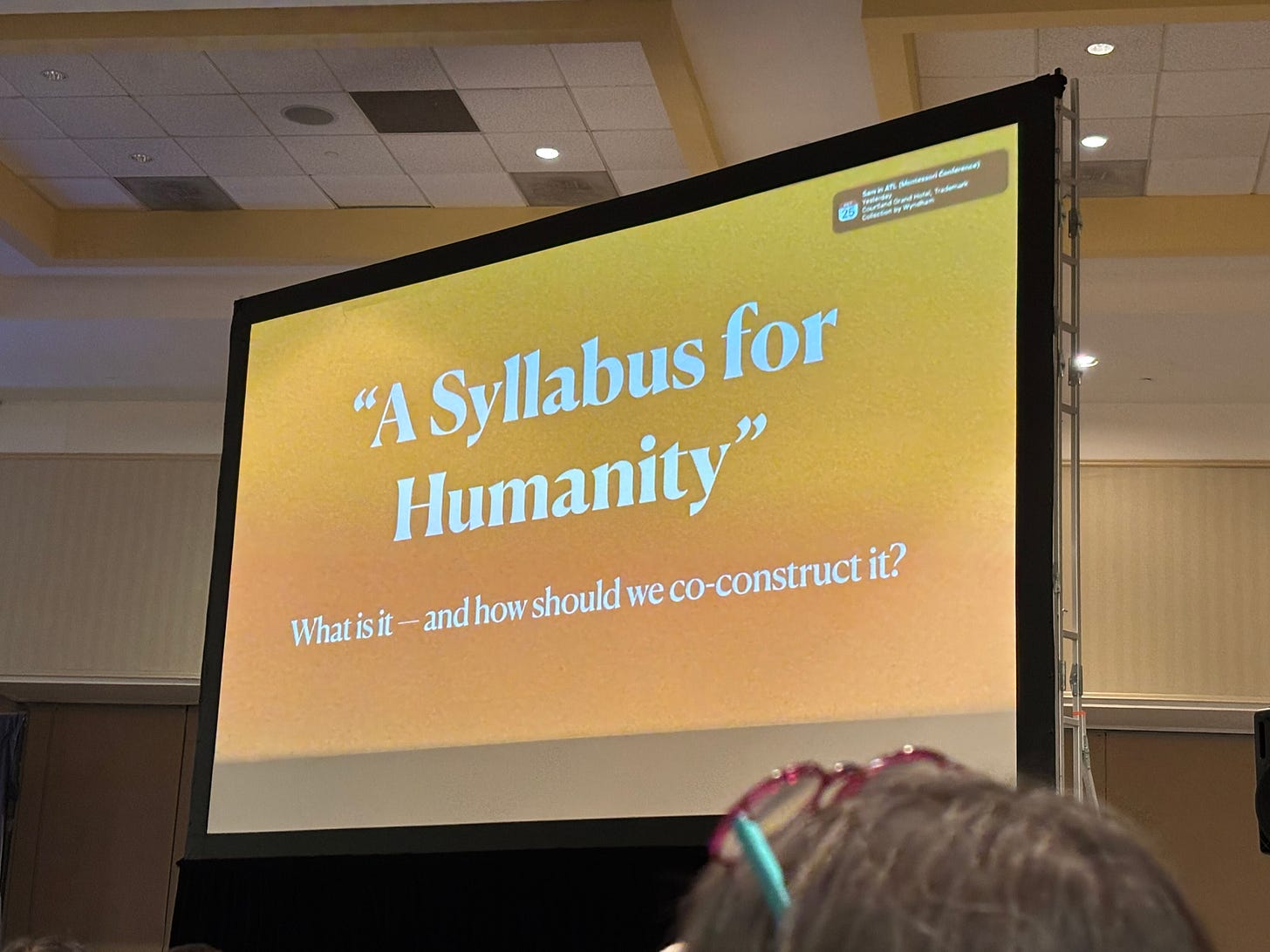
What is the purpose of education in a world of uncertainty, inequity, and chaos?
How can education be a tool for social transformation, rather than a tool for social reproduction?
I am deeply considering these questions after
’s keynote address at the International Montessori Council’s Peace Academy Conference this weekend.Sam began his keynote by discussing the unique challenges we face today: A growing difficulty to know what is true and what is fake, new emerging technologies and their unknown impact on young people, and a world where loneliness and isolation are on the rise.
We also live in a time of rising inequities around the world. Our (and my) US tax dollars, instead of combatting this inequity, are going to the military industrial complex, to countries committing genocide and human rights abuses. The “West” is in free-fall around the world and no one seems to want to admit it. The very pillars of stability are crumbling, leaving many to ask “what’s next?”
In these times, I am reminded of this quote from Bayo Akomolafe: “These times are urgent: Let’s slow down.”
I am also reminded of Maria Montessori’s work; that she called on us not to merely reform education, but to foster a complete social revolution. Dr. Montessori argued that education would be the lever through which we radically transform society so that the human and non-human world could live in systems of equitable interdependence.
We must remind ourselves in times when we feel that we have so much to do: meeting standards, filling out the incident report, writing college letters of recommendation, that we must slow down and consider what is most important: that our sole goal is to foster a social revolution, triggered by (but not isolated to) education.
In his keynote, Sam called on us to consider the following: “What is a Syllabus for Humanity, and how should we co-construct it?”
In traditional education, a syllabus is a set of rules to follow:
Read this book by this date
Take this exam at this time
If you’re late, you will be penalized in these ways
But a Syllabus for Humanity is radically different.
A Syllabus for Humanity is not a list of things that an instructor will do to a student if they don’t comply with their rules.
A Syllabus for Humanity is an invitation to dispositions for engaging life in a system of equitable interdependencies, for creating the social revolution that Montessori described, for all people, across the age span.
It is an emerging project: Never complete, always continuing to be built.
We must be unwavering in our commitment to liberatory education and human flourishing for all and not wait for the conditions to be “just right” for this to exist. The right moment will not come, the revolution will not be funded.
We must create Montessori’s vision of an ameliorated society now, here, in our communities. We cannot wait for someone to save us. We must exist in the emerging, knowing that we have the power to radically change our world.
We must reach out, connect with each other, and realize the interdependencies that already exist between all human beings on this planet. This is our work with children, but it’s also our work with adults.
It’s why Dr. Montessori wrote that this is an education “capable of saving humanity.”
Co-Constructing the Syllabus for Humanity
I am very intrigued by the possibility of co-constructing a Syllabus for Humanity which embodies the evolving, diverse, and dynamic nature of how we can transform education and our society at large.
If you’re interested in doing this work with me, reply to this post! I’d love to hear from you and how this resonated with you.
Here’s one more core idea from Sam’s keynote:
“How do you make someone change? You can’t. What you can do is create an environment where the greatest likelihood of change is possible.”
This is what we do every day in our Montessori classrooms. It’s time we did this with society at large. Let’s co-construct a Syllabus for Humanity together!
Join our Waitlist for The Enlightened Educator Cohort 2!
October is the time when our start-of-the-year-idealism fades and stress builds.
The ambitions we had in August begin to look like pipe dreams compared to all the tasks on our plate.
But what if your October could tell a different story?
The reality is, those ambitions aren't pipe dreams. They are right around the corner, if you're willing to take the right steps.
Our second cohort is a four-month program designed to turn this period of difficulty into a moment for you to strengthen your resilience, develop new tools to support your own wellbeing, and enhance your practice as an educator.
The cost of not being in this cohort may very well be your longevity in the field and the impact you are capable of having in the lives of young people.






Andrew, I have been working for several years at Risk & Progress building a pro-human progress essay series. I, like you, view this project as "never ending." As time allows, I will grow this to include a course and possible childrens books.
I would like to assist in any way that I can.